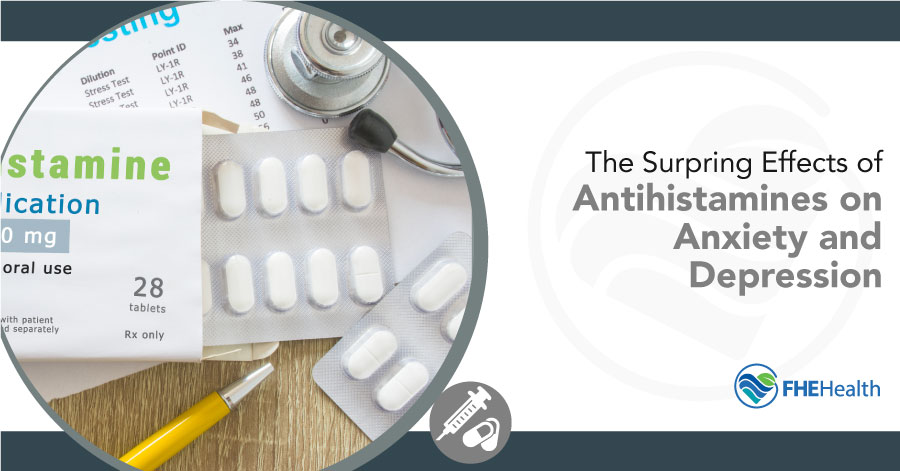If you’ve ever found yourself battling both anxiety and allergies, you may be wondering if it’s safe to take anti-anxiety medications along with antihistamines. Well, you’re in the right place! In this article, we’ll explore the question: “Can anti-anxiety medications be taken with antihistamines?” We’ll delve into the potential interactions between these two types of medications and provide you with the information you need to make informed decisions about your health.
When it comes to managing both anxiety and allergies, it’s essential to understand how different medications may interact with one another. While antihistamines are commonly used to relieve allergy symptoms such as sneezing, itching, and runny nose, anti-anxiety medications are prescribed to alleviate symptoms of anxiety disorders. However, it’s important to note that not all medications play well together. So, let’s dive deeper into the potential interactions between anti-anxiety medications and antihistamines to ensure you have all the facts before taking them concurrently.

Can Anti-Anxiety Medications Be Taken With Antihistamines?
When it comes to managing both anxiety and allergies, many people find themselves wondering if it is safe to take anti-anxiety medications and antihistamines together. Anxiety and allergies are two common health issues that can significantly impact a person’s well-being. While there is no direct connection between the two conditions, they can coexist, leading individuals to seek relief from symptoms associated with both. However, it is important to understand the potential risks and interactions between these medications before combining them.
Understanding Anti-Anxiety Medications
Anti-anxiety medications, also known as anxiolytics, are prescribed to individuals experiencing symptoms of anxiety disorders. These medications work by targeting the brain’s neurotransmitters to help reduce feelings of anxiety, stress, and fear. Commonly prescribed anti-anxiety medications include benzodiazepines, selective serotonin reuptake inhibitors (SSRIs), and serotonin-norepinephrine reuptake inhibitors (SNRIs).
It is crucial to note that anti-anxiety medications are prescribed based on an individual’s specific needs and medical history. They should only be taken as directed by a healthcare professional, and any concerns or questions should be discussed with a doctor or pharmacist.
Potential Interactions Between Anti-Anxiety Medications and Antihistamines
Antihistamines, on the other hand, are commonly used to relieve symptoms associated with allergies, such as sneezing, itching, and runny nose. These medications work by blocking the effects of histamine, a compound released by the immune system during an allergic reaction.
While there is generally no direct interaction between anti-anxiety medications and antihistamines, it is essential to be cautious when combining them. Some antihistamines, particularly first-generation antihistamines, can cause drowsiness as a side effect. When taken with certain anti-anxiety medications, which may also cause drowsiness, the sedative effects can be enhanced. This can potentially lead to increased drowsiness and impaired cognitive function.
It is important to read the labels and packaging of both medications and consult with a healthcare professional before combining them. They can provide guidance on the appropriate dosage and potential risks associated with taking anti-anxiety medications and antihistamines together.
Benefits of Combining Anti-Anxiety Medications and Antihistamines
While caution must be exercised when combining anti-anxiety medications and antihistamines, there may be situations where the benefits outweigh the potential risks. For individuals who experience anxiety-related symptoms triggered by allergies, such as shortness of breath or panic attacks, combining these medications under medical supervision may provide relief from both conditions simultaneously.
Furthermore, some second-generation antihistamines have a lower risk of causing drowsiness compared to first-generation antihistamines. These non-drowsy antihistamines may be more suitable for individuals who are already taking anti-anxiety medications and want to manage their allergy symptoms without exacerbating sedation.
Tips for Combining Anti-Anxiety Medications and Antihistamines
1. Consult with a healthcare professional: Before combining any medications, it is crucial to consult with a healthcare professional who can assess the individual’s medical history, current medications, and specific needs. They can provide personalized advice and guidance based on the individual’s unique circumstances.
2. Follow dosage instructions: It is essential to read the labels and packaging of both medications carefully. Follow the recommended dosage instructions provided by the healthcare professional or indicated on the packaging to ensure safe and effective use.
3. Monitor for side effects: Pay close attention to any side effects that may arise from combining anti-anxiety medications and antihistamines. Common side effects include drowsiness, dizziness, and impaired coordination. If any concerning side effects occur, contact a healthcare professional.
4. Be mindful of driving or operating machinery: Due to the potential sedative effects of both anti-anxiety medications and antihistamines, it is important to use caution when driving or operating machinery. These medications can impair cognitive function and reaction time, making it unsafe to engage in activities that require alertness.
In conclusion, combining anti-anxiety medications and antihistamines should be approached with caution. While there is generally no direct interaction, it is important to consider the potential risks, particularly regarding sedation. Consulting with a healthcare professional and following their guidance is crucial to ensure safe and effective use of these medications.
Key Takeaways: Can anti-anxiety medications be taken with antihistamines?
- It is generally safe to take anti-anxiety medications and antihistamines together, but it is important to consult with a healthcare professional first.
- Combining these medications may cause drowsiness and dizziness, so it is advisable to avoid activities that require alertness.
- Certain antihistamines can interact with specific anti-anxiety medications, so it’s crucial to disclose all the medications you are taking to your doctor.
- Individuals with certain medical conditions, such as glaucoma or urinary retention, should use caution when taking both types of medications simultaneously.
- Always follow the recommended dosage and frequency of each medication, and if you experience any unusual side effects, contact your healthcare provider immediately.
Frequently Asked Questions
Question 1: Can I take anti-anxiety medications and antihistamines together?
Yes, it is generally safe to take anti-anxiety medications and antihistamines together. However, it is important to consult with your healthcare provider before combining these medications, as they may interact with each other and cause unwanted side effects.
Antihistamines are commonly used to treat allergies and can cause drowsiness as a side effect. Some anti-anxiety medications, such as benzodiazepines, also have sedative effects. Taking these medications together may increase the risk of excessive drowsiness and impaired coordination. Your healthcare provider can provide guidance on the appropriate dosage and timing to minimize these risks.
Question 2: Can antihistamines interfere with the effectiveness of anti-anxiety medications?
Antihistamines are unlikely to interfere with the effectiveness of anti-anxiety medications. Antihistamines primarily work by blocking the effects of histamine, a substance released during allergic reactions. They do not directly affect the mechanisms of action of anti-anxiety medications.
However, some antihistamines can cause drowsiness, which may indirectly affect the effectiveness of anti-anxiety medications that are meant to promote wakefulness. If you experience excessive drowsiness or other unusual side effects while taking both medications, it is important to consult with your healthcare provider to ensure the best treatment outcomes.
Question 3: Are there any potential interactions between specific anti-anxiety medications and antihistamines?
Certain anti-anxiety medications and antihistamines may interact with each other, leading to increased side effects or reduced effectiveness. For example, benzodiazepines, a class of anti-anxiety medications, can enhance the sedative effects of antihistamines, potentially causing excessive drowsiness and impaired coordination.
It is important to inform your healthcare provider about all the medications you are taking, including both anti-anxiety medications and antihistamines. They can evaluate potential drug interactions and adjust your treatment plan accordingly to ensure your safety and well-being.
Question 4: Can I take over-the-counter antihistamines with prescription anti-anxiety medications?
It is generally safe to take over-the-counter antihistamines with prescription anti-anxiety medications, but it is important to consult with your healthcare provider to ensure there are no potential interactions or contraindications. Over-the-counter antihistamines may contain different active ingredients and have varying side effects, so it is important to choose the appropriate one based on your specific needs and medical history.
Your healthcare provider can provide guidance on the best combination of medications for your individual situation. They can also recommend specific brands or formulations that are safe to use alongside your prescription anti-anxiety medication.
Question 5: What are the potential side effects of combining anti-anxiety medications and antihistamines?
Combining anti-anxiety medications and antihistamines can increase the risk of side effects such as drowsiness, dizziness, and impaired coordination. These side effects can be more pronounced in individuals who are sensitive to the sedative effects of these medications.
In rare cases, combining certain anti-anxiety medications and antihistamines may lead to more serious side effects, such as respiratory depression or slowed heart rate. It is important to monitor your response to the medications and seek immediate medical attention if you experience any concerning symptoms.
Side effects due to prolonged use of antihistamines – Dr. Sriram Nathan
Final Summary: Can anti-anxiety medications be taken with antihistamines?
After exploring the topic of whether anti-anxiety medications can be taken with antihistamines, it is clear that caution should be exercised when combining these two types of medications. While there is no definitive answer that applies to every individual, it is important to consider the potential interactions and consult with a healthcare professional for personalized advice.
In conclusion, taking anti-anxiety medications and antihistamines together may pose risks and potential side effects. It is crucial to prioritize your health and well-being by seeking guidance from a medical expert who can assess your specific situation. Remember, everyone’s body reacts differently to medications, so what works for one person may not work for another. By staying informed and seeking professional advice, you can make the best decisions for your health and ensure your safety when it comes to medication combinations.


